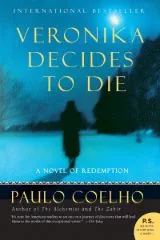Waiting for Godot by Samuel...
When the first act of a play starts with two...
By Ethan Griffin1865

0

As bleak and uninviting as the title looks, the aim of this novel is to make sense of the world and encourage readers not to linger in any kind of lifestyle they don't completely believe in.
Truth be told, this can be viewed as a typical Coelho novel aiming to give a more realistic approach towards self-help. Self-help books may only be a corny way of saying that life is beautiful, so appreciate every instant.
However, behind those expected words in this book is a much more elaborate message. Truth be told, Veronika Decides to Die might give the impression of a much more epic tale in the buildup of the story, but it doesn’t quite amount to anything.
The premise behind the story is that everyone is as impressionable as Veronika when it comes to reigniting the withering will to live within. To an extent, the hero’s transition from someone who has lost all desire to live, to someone willing to get out of bed with a smile on their face is a bit unsatisfying.
Veronica, who is about 24, appears to have it all; young and pretty, surrounded by men, has a caring family, and a decent job. Yet, her life had an emptiness that dulled everything. Therefore, Veronika decides to die one November morning.
She takes several pain-medication pills to guarantee that she never wakes up. Evidently, she did, and in a psychiatric ward where she is shaken by the news that she has got only one day to live, due to complications from the overdose.
It is not going to be a cakewalk reading Veronika Decides to Die. It hurts you, it makes you wonder, but most of all, it makes you fall for the plot. This is a beautiful bestselling book that guides readers to pursue meaning in a culture shaded with misery, soullessness, and ineffable conformity.
On the basis of experiences in the life of the author, the novel challenges the value of tragedy and praises those who do not fall into society's norms.
Updated 4 years ago